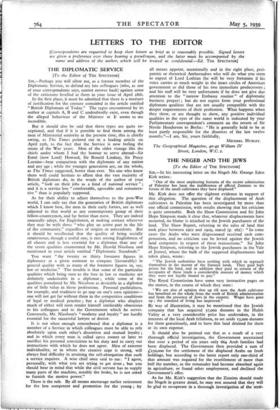LETTERS TO THE EDITOR
[Correspondents are requested to keep their letters as brief as is reasonably possible. Signed letters are given a preference over those bearing a pseudonym, and the latter must be accompanied by the name and address of the author, which will be treated as confidential.—Ed. THE SPECTATOR]
THE DIPLOMATIC SERVICE
[To the Editor of THE SPECTATOR]
Sts,—Perhaps you will allow me, as a former member of the Diplomatic Service, to defend my late colleagues (who, as one of your correspondents says, cannot answer back) against some of the criticisms levelled at them in your issue of April 28th.
In the first place, it must be admitted that there is a measure of justification for the censure contained in the article entitled " British Diplomats of Today." The types encountered by its author at capitals A, B and C undoubtedly exist, even though the alleged behaviour of the Minister at E seems to me incredible.
But it should also be said that these types are quite ex- ceptional, and that if it is possible to find them among the men of Ministerial seniority at the present time, this is chiefly owing, as The Times pointed out in a leading article on April 25th, to the fact that the Service is now feeling the strain of the War years. Men of the older vintage like the chiefs under whom I had the honour to serve abroad—Sir Esme (now Lord) Howard, Sir Ronald Lindsay, Sir Percy Loraine—bear comparison with the diplomats of any nation and any age ; while the younger generation are, on the whole, as The Times suggested, better than ever. No one who knew them well could hesitate to affirm that the vast majority of British diplomats do, in the words of the author of your article, " look on their jobs as a kind of national service " ; and it is a service less " comfortable, agreeable and remunera- tive " than is popularly supposed.
As for their ability to adjust themselves to the post-War world, I can only say that the generation of British diplomats which I know best, the men in their early forties, are as well adjusted to that world as any contemporary group of their fellow-countrymen, and far better than most. They are indeed unusually adept, for Englishmen, at making contact wherever they may be with those " who play an active part in the life of the community," regardless of origins or antecedents. But it should be recollected that the quality of being socially omnivorous, though a useful one, is rare among Englishmen of all classes and is less essential for a diplomat than any of the seven qualities enumerated by Mr. Harold Nicolson and mentioned in your article entitled " Diplomatic Standards."
You want " the twenty or thirty foremost figures in diplomacy at a given moment to compare (favourably) in general quality with as many of the foremost figures in, say, law or medicine." The trouble is that some of the particular qualities which bring men to the fore in law or medicine are definitely undesirable in a diplomat ; while some of the qualities postulated by Mr. Nicolson as desirable in a diplomat are of little value in those professions. Personal pushfulness, for example, and readiness to go nap on one's own opinions— one will not get far without them in the competitive conditions of legal or medical practice ; but a diplomat who displays much of either will soon render himself intolerably obnoxious to his colleagues and to the Government which he serves. Conversely, Mr. Nicolson's " modesty and loyalty " are hardly essential for the successful lawyer or doctor.
It is not often enough remembered that a diplomat is a member of a Service in which colleagues must be able to rely absolutely upon each other's discretion and mutual loyalty ; and in which every man is called upon sooner or later to sacrifice his personal convictions to his duty and to carry out
instructions with which he does not agree. Men of extreme individuality, or in whom the creative urge is strong, will always find difficulty in attaining the self-abnegation that such
a service requires. A wise chief once said to me: " I agree, personally, with what you are trying to get done ; but you
should bear in mind that while the civil servant has to supply many parts of the machine, notably the brake, he is not asked to furnish the motive power."
There is the rub. By all means encourage earlier retirement for the less competent and promotion for the young ; by all means appoint, occasionally and in the right place, peri- patetic or rhetorical Ambassadors who will do what you seem to expect of Lord Lothian (he will be very fortunate if his voice carries as much weight in the inner circles of American government as did those of his two immediate predecessors ; and his staff will be very unfortunate if he does not give due attention to the " narrow Embassy routine " of diplomatic business proper) ; but do not expect from your professional diplomats qualities that are not usually compatible with the deeper requirements of their profession. What happens when they show, or are thought to show, any positive individual qualities in the eyes of the outer world is indicated by your Parliamentary correspondent's comment on the return of Sir Nevile Henderson to Berlin : " He is generally held to be at least partly responsible for the disasters of the last twelve months."—I am, Sir, yours faithfully,
MICHAEL HURLEY.
The Geographical Magazine, 40-42 William IV Street, London, W.C. 2.














































 Previous page
Previous page